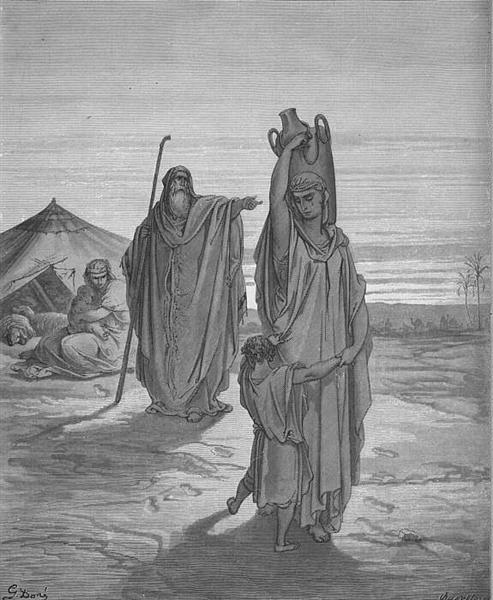The views expressed in our content reflect individual perspectives and do not represent the authoritative views of the Baha'i Faith.
Was not our ancestor Abraham considered righteous for what he did when he offered his son . . . on the altar?
You see that his faith and his actions were working together, and his faith was made complete by what he did. – James 2:21-22.
With Isaac growing up in Canaan and Ishmael established in Arabia, life ought to have been quiet for Abraham, but it didn’t work out that way. God commanded him to:
Take your son, your only son, whom you love… and go to the land of Moriah. Sacrifice him there as a burnt offering on one of the mountains… – Genesis 22:2.
Two questions immediately arise on reading these alarming sentences: Which son was the “only son,” and why did God call for such a strange sacrifice?
According to the text of Genesis, Isaac was the one to be sacrificed. This statement has caused much confusion because it was impossible for Isaac to be Abraham’s only son. There was just one child who could have been the only, and that would have been Ishmael in the years before Isaac was born.
The mystery continued even after the coming of Jesus because he never mentioned the sacrificial victim by name. The only identification was done by one of the apostles—James—who simply echoed the Genesis text in identifying the son as Isaac.
The first hint of a solution to the quandary occurred when Muhammad, as quoted in the Qur’an, strongly hinted that Ishmael was the sacrificial son, and implied that the incident took place before the birth of Isaac, during the period of time when Ishmael truly was “the only son.” Baha’u’llah later confirmed Muhammad’s hint by directly identifying Ishmael as the one who was to be offered up:
That which thou hast heard concerning Abraham, the Friend of the All-Merciful, is the truth, and no doubt is there about it. The Voice of God commanded Him to offer up Ishmael as a sacrifice, so that His steadfastness in the Faith of God and His detachment from all else but Him may be demonstrated unto men. – Baha’u’llah, Gleanings from the Writings of Baha’u’llah, pp. 75-76.

Expulsion of Ishmael and his mother
The corrections given by Muhammad and Baha’u’llah to the account in Genesis make it clear that, for whatever reason, the version of the sacrifice given in Genesis is not perfect. We don’t know why Jesus didn’t mention and correct the error, but he might have realized that his followers were not yet ready to appreciate Ishmael’s rightful place in the Abrahamic drama.
Perhaps the true identity of the only son was part of what Jesus referred to when he said, “I have yet many things to say unto you, but ye cannot bear them now.” Another possibility is that Jesus wanted His followers to come to the realization all by themselves that, from a spiritual point of view, the name of the sacrificial son has never been essential to the story because the pivotal point of the incident is not the child’s identity but the fact that Abraham was willing to obey God’s command.
The thought of killing one’s child, even if called by God to do so, is so repugnant that this incident has caused more outrage, confusion, anger, and sorrow in human hearts than any other part of Abraham’s life. Contemporary eyes sometimes view this as “a horrible story; it depicts God as a despotic and capricious sadist, and it is not surprising that many people today who have heard this tale as children reject such a deity.” – Karen Armstrong, A History of God: The 4000-year Quest of Judaism, Christianity, and Islam, p. 18.
Getting beyond the horror requires a serious study of the mystery of sacrifice, especially as it pertains to the life of a messenger of God.
By all accounts, it is dauntingly difficult to come to terms with accepting the station of being a prophet of God. The first challenge every messenger faces is to sacrifice his own wants. He must willingly surrender any hope of experiencing the pleasures of a normal life and accept all of the difficulties inherent in announcing a new revelation from God. He knows from the beginning that he will face constant rejection, persecution and harassment; and that he may be tortured, jailed, reviled, spat upon, or killed.
The Bab, recounting his own moment of realizing what fate had in store, said,
I heard a voice calling in my inmost being: ‘do thou sacrifice the thing which Thou lovest most in the path of God…’ – quoted by Baha’u’llah in The Book of Certitude, p. 231.
Jesus, when he was anointed by the Holy Spirit, spent forty days in the wilderness wrestling with the knowledge of what would befall him as soon as he began preaching a new doctrine. Baha’u’llah, who retreated to the remote uplands of Kurdistan for two years before announcing his revelation, vividly described the way in which he, too, was overcome with tumultuous emotions:
From our eyes there rained tears of anguish, and in our bleeding heart surged an ocean of agonizing pain. – Ibid., p. 250.
When, in spite of knowing the price he will pay, a messenger of God embraces the future, he does so out of devotion to God and because he feels an overwhelming love for humanity. He understands that his self-sacrifice has the power to ignite a torch of spirituality that will illumine the souls of those who are ready to accept a new message from God and, through them, change the world:
This is the reason why the universal Manifestations of God unveil Their countenances to man, and endure every calamity and sore affliction, and lay down Their lives as a ransom; it is to make these very people, the ready ones, the ones who have capacity, to become dawning points of light, and to bestow upon them the life that fadeth never. This is the true sacrifice: the offering of oneself, even as did Christ, as a ransom for the life of the world. – Abdu’l-Baha, Selections from the Writings of Abdu’l-Baha, p. 64.
Next: The Ransom
You May Also Like
Comments

















No ...man can ever claim to have comprehended the nature of the hidden and manifold grace of God; none can fathom His all-embracing mercy." - Bahaullah
..just thoughts.. Gayl